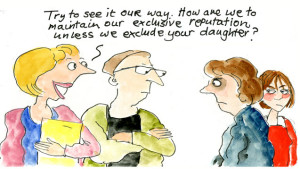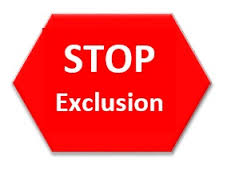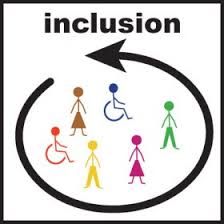Living with Disabilities…Struggling with Exclusion
June 25th, 2015 | Published in (Dis)ability, Guest posts
Guest post by Cheryl McDonnell
My name is Cheryl McDonnell and I have been living with disabilities for twenty-seven years – my own and those of my daughter. We were injured in an accident when my daughter was six months old. We have been on a learning curve ever since.
First encounter with social exclusion
Our first encounter with exclusion was the day I was preparing to take my daughter home from hospital after our accident. A doctor suggested she should go to a home.
I followed his advice and took her to my home.
It shocked me that in the back end of the twentieth century anyone would even consider suggesting a baby was better off anywhere other than with its mother in the family home. The very idea I should exclude my daughter from our home because she had disabilities  horrified me. She did not need to be rejected by her family. She needed to be accepted by the world as she now is, disabilities and all.
horrified me. She did not need to be rejected by her family. She needed to be accepted by the world as she now is, disabilities and all.
“It’s not fair,” I protested then, and many times since.
Multiple exclusions – from church, community, family, personhood, education
- We were soon excluded from our church community. Nobody actually said we should not attend, or that we were not welcome, but when we said we needed help to get there (as I could no longer rely on my muscles and bones to do so) there were no volunteers to give us a lift.
It did turn out they did us a big favor, because instead of relying on some wizard in the sky to lead us along we had to find our own way and that built a lot of resilience. - We learnt, when out and about in general community, and (especially painfully) with family, to ignore staring and offhand comments, and even outright suggestions about the advantages of legalising euthanasia.
On rare occasions adults would invite me to coffee or Tupperware parties and imply that no children would be present. I would then turn up to find everyone but I had brought their children. I guess there was no way, without exposing their heartlessness, to say “don’t bring the broken one”!
- We learnt that people did not value my daughter as a whole and worthwhile human being. She was, in effect, excluded from personhood. One woman did not even bat an eyelid when we were having coffee and a chat at her place and her daughter stepped right onto my daughter’s back as she lay on her rug on the floor.
- Education has been a huge challenge. Initially, I attempted to enrol my daughter at our local school where her younger sister and brother would attend when their time came. No one actually said she could not attend, but it was made more than clear that she most certainly did not belong. She ended up attending school over an hour from home and the bus trip in the ‘special bus’ was a two-hour ordeal as it picked up other students along the way.
The education system becomes no more inclusive as children with severe intellectual disabilities grow older. TAFE (Technical and Further Education) courses in NSW (New South Wales) are only accessible if the course will help participants achieve employment.
Try enrolling in a drama course. Even if you can pay your own carer to accompany you and work with you and help you participate you will be excluded. There are policies and protocols and precious procedures (about Occupational Health and Safety, Duty of Care etc.) that will be used to reject your application.
Perhaps a pottery course at the local community college would be better for you!
Exclusion and compartmentalisation of the whole family
We were excluded, it seemed, at every turn, and I say ‘we’ because even if my daughter had little solidarity from anyone else she was damn well going to get it from me.
My younger children also suffered many exclusions, rarely being invited to friends’ birthday parties, for example and, on more occasions than not, having no other children at their own. They could not attend after-school activities either, because I had to be home waiting for their sister to be delivered home from her school. Sports, dance and music were not for them.
When my youngest started school his behavior problems escalated and he was shipped off to another school with a behavior management program. I now had three children in three different schools.
Talk about a compartmentalised society!
My two youngest did eventually end up back in the same school after a house move and lot of work with some really great psychologists. My elder daughter was, however, still excluded from her local school.
The social exclusion of me and the children was my greatest heartache.
We could, one suggestion went, join a group for parents and siblings of children with disabilities. That made me angry. Why could society not simply accept everyone? Why the compartmentalisation into able-bodied and disabled? Why does our language even have words like ‘disabled’ and ‘able-bodied’? (Click here for a discussion of ableist language.)
disabilities. That made me angry. Why could society not simply accept everyone? Why the compartmentalisation into able-bodied and disabled? Why does our language even have words like ‘disabled’ and ‘able-bodied’? (Click here for a discussion of ableist language.)
I have worked hard to help my kids focus on what is possible (like enjoying each other’s company, and being a family regardless) and not on what is impossible (like getting society to change) but my heart breaks.
How can my fellow humans be so damn cruel?!
Physical barriers
With all of these barriers to social inclusion you might think that would be more than enough. The manufactured architecturally engineered part of the world, however, is also full of exclusions.
- That heavy old wooden door you have to lean against at the local café is an architectural exclusion of every single person who does not have sufficient strength and balance to push the door open and step in.
- Every single step or stair is a social exclusion. If you have one or more steps into a business, and a heavy door, you might as well hang a sign: “Only SOME people welcome here”.
- Lack of footpaths is a social exclusion. My daughter walks along the road near our home because there is no footpath and the ground is uneven.

- Educational institutions (particularly those with large lecture halls) exclude students with auditory disabilities unless they require staff to use microphones.
- Signs that have no braille exclude those who cannot see to read them.
- Inquiries, meetings, public gatherings, hospitals and health services exclude people when no attention is paid to access.
Who will do what and when to make a difference?
More than thirty years after the “Breaking Down the Barriers” campaign during the 1981 International Year of Disabled Persons, I find myself wondering why our society still has so many barriers. We find money for many things – the 2000 Olympics, for example, refurbishing Kirribilli House, keeping our past Prime Ministers in secretaries, and yet we do not sufficiently value people who have disabilities to make our manufactured world accessible to them.
My elder daughter is now 27. She is on the whole happy and healthy, but a long way from being fully included. There are many barriers that need to be ripped down. Our society is broken, and supported in its brokenness by broken systems that are failing everyone.
Who will do what and when to make a difference? (Click here to link to a campaign for achieving practical change.)
By Cheryl McDonnell, guest blogger…Comments are warmly invited








Article on being an ‘ally’ for people with disabilities: http://mashable.com/2015/07/26/disability-ally-inclusive/?utm_cid=mash-prod-email-topstories&utm_emailalert=daily&utm_source=newsletter&utm_medium=email&utm_campaign=daily
You are right in everything you have just said! But I am finding the Education a major one at the moment! I can’t afford to pay my own carer. I get carers from the government organisation say it’s not in ‘their’ job description to allow me help at Tafe / Uni. But yet Tafe / Uni say that if I bring my own carers they are more than happy to have me, but they don’t supply them….. So it’s like talking to brick walls! What do you do? I have a fully cognitive mind, but yet can’t actually go and study anything because the lack of understanding against the two companies and the system! Grr it is so frustrating!!
Hi Cyanne,
Yes, there seems to be many blocks to the ideal of continuing education for people with disabilities. With the upcoming introduction of the National Disability Insurance Scheme, NDIS in Australia I would suggest that you make support for further education a priority in your NDIS plan. I know there is still a bit of a wait in most areas for NDIS for adults but to know there might be some light at the end of the frustrating ‘not in my job description’ tunnel means you have time to plan.
There is a facebook group called NDIS Discussion Group where people discuss what support they already get from NDIS and what they would like to get and how to best prepare for NDIS planning meetings.
I hope this gives you some hope to keep aiming for your dreams.
Kind Regards
Cheryl